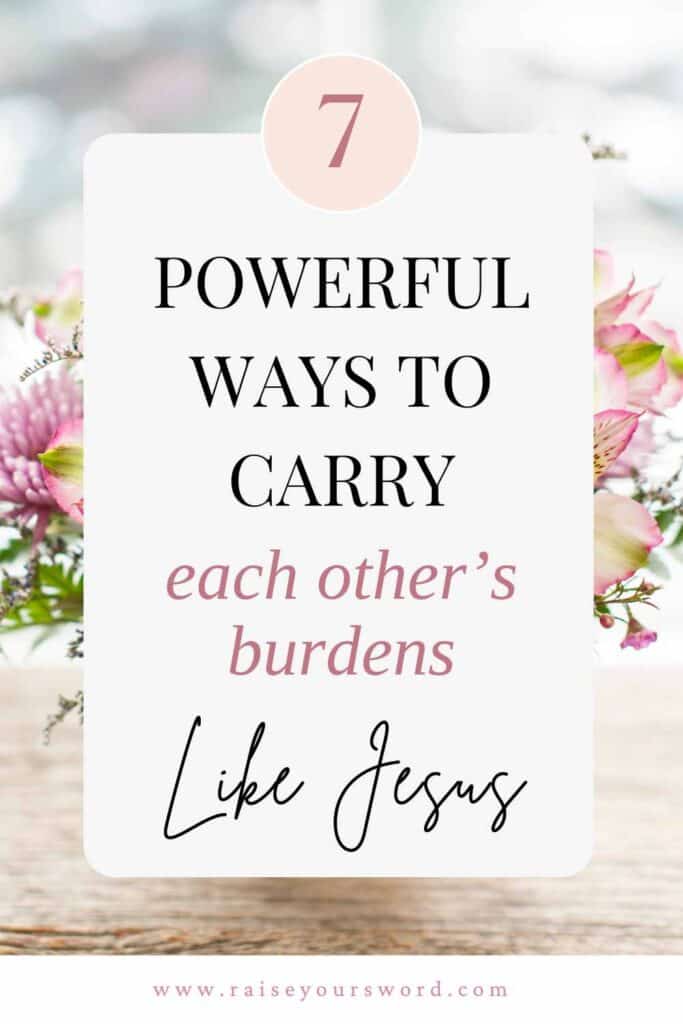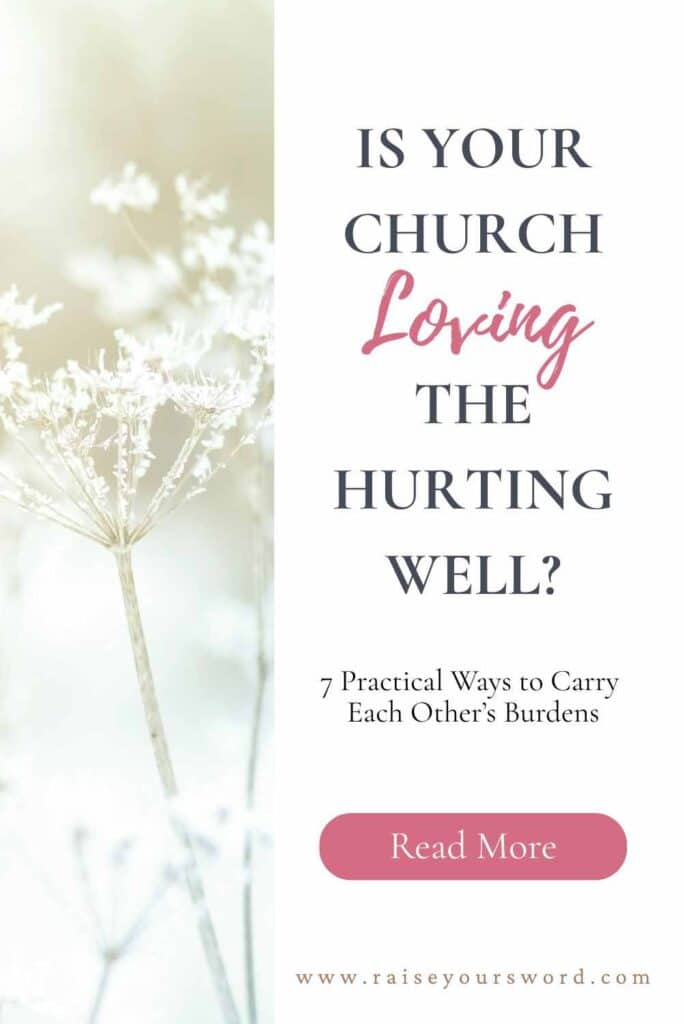In this blog post, we’re answering the question: How do we carry each other’s burdens like Christ? We’ll unpack 7 practical, biblical ways to support the hurting in your church – so your community becomes a place of healing, not hiding.
The Church was never meant to be a place for perfect people. It’s meant to be a refuge for the broken, a hospital for the wounded, and a community of grace where people can struggle without shame.
If we want to walk like Jesus, we must learn to carry one another’s burdens with truth, tenderness, and love. Let’s show the world what it looks like to be the Church – a people who love deeply, support faithfully, and reflect Christ by how we care for the hurting.
This is Part 4 of our series, Hope in the Hard Places. If you missed Part 1, click here to read “Why Does God Allow Suffering?” – it lays a biblical foundation for understanding pain and finding purpose in hard seasons.

What Does It Mean to Carry Each Other’s Burdens?
Carrying each other’s burdens isn’t just a nice idea; it’s a command rooted in Christlike love. It’s having a willingness to step into the messy and it comes from Galatians 6:2 “Carry each other’s burdens, and in this way you will fulfill the law of Christ.”
What does the bible mean by carrying each other’s burdens? It means showing up when someone is grieving, sitting in the silence of someone’s depression, and choosing compassion over comfort.
It’s not about having the perfect words or fixing someone’s pain. It’s about walking with them, just as Jesus walks with us.
Practical Ways to Bear One Another’s Burdens:
The Church is called to be the hands and feet of Jesus. Here are 7 practical ways to bear each other’s burdens and reflect God’s love in everyday life with tenderness, wisdom, and grace.
1. See the Person, Not Just the Struggle
The first step in learning how to carry one another’s burdens is to see the person behind the pain.
It’s easy to define people by their pain: “She’s depressed.” Or, “He’s the one going through a divorce.” Or, “They’re dealing with addiction.”
But Jesus never labeled people by their brokenness. He saw the whole person, made in God’s image, worthy of love, dignity, and compassion at all times, every single day.
“When Jesus saw the crowds, he had compassion on them, because they were harassed and helpless, like sheep without a shepherd.” Matthew 9:36
Let’s start by seeing people the way Jesus sees them, not as problems to be fixed, but as beloved sons and daughters to be loved.
Related: A Fresh Reminder of the Compassion of Jesus
2. Don’t Offer Quick Fixes – Offer Presence Instead
One of the most meaningful ways to carry each other’s burdens is simply by being present. When someone is hurting, they often don’t need advice, they need empathy. This has been a hard lesson for me because I always want to try to “fix” the problem.
Jesus showed us how to enter pain with compassion, not quick solutions. In stories like the woman with the issue of blood (Luke 8:43–48) or blind Bartimaeus (Mark 10:46–52), Jesus didn’t rush past the hurting. He noticed them, made space for their story, and treated them as individuals, not interruptions. His compassion began with presence, not performance.
In John 11:35, when Lazarus died, Jesus knew He would raise him from the dead — yet He still wept with Mary and Martha. He entered their sorrow fully. He didn’t dismiss their grief or skip to the miracle. Jesus chose to feel the pain with them before doing anything about it.
His compassion wasn’t about a quick fix, it was about wholeness.
If you’re wondering how to carry each other’s burdens like Christ, start by listening well, showing up faithfully, and offering quiet support over easy answers.
Sometimes, the most Christlike thing you can do is sit with someone in their pain. Or, take them to coffee and just let them unload and share their burdens with you freely.
Related: For Your Sake – Living in Light of His Sacrifice
3. Create a Culture of Honesty, Not Perfection
Learning how to carry one another’s burdens like Christ means creating a safe space for vulnerability and honesty.
Does anyone else feel the pressure to wear a mask at church? You know the drill — “I’m fine, you’re fine, we’re all fine!”
But inside? You might be breaking.
In some Christian circles, there’s an unspoken pressure to act like we’ve got it all together, even when we’re barely holding on. Have you ever been there? Hiding your hurt behind a smile, afraid to be honest about the pain you carry?
I’ve been there too. And if you’ve worn the mask before, you probably know how to spot it in others, the quiet signs of someone struggling in silence.
If we’re paying attention, we’ll see it:
- Eyes that once sparkled now seem dull.
- Smiles that don’t quite reach the heart.
- Shoulders slumped with invisible burdens.
- Faces lined with pain no one has asked about.
But how do we create a culture where it’s safe to be real? Where someone can say, “I’m not okay today.” Or admit, “I’m in the battle of my life emotionally and mentally, and I could use some help.” Or even confess, “I’m struggling to keep pressing on.”
Honesty opens the door to healing.
When we speak the truth about our pain, we invite others into it, and suddenly, the burden feels a little lighter. As the saying goes, “a burden shared is a burden divided.” I also love, “bear one another’s burdens that they may be light.”
James 5:16 reminds us: “Confess your sins to each other and pray for each other so that you may be healed.”
Let’s be intentional about creating spaces in our churches and communities where truth and tenderness meet – where it’s okay to not be okay. And maybe it starts with you and me. Maybe it starts today.
4. Be the Hands and Feet of Jesus
One of the most powerful ways to carry each other’s burdens is through simple, consistent acts of love. Jesus didn’t just preach compassion, He lived it, meeting practical needs with gentleness and presence.
We reflect Him when we bring meals to a grieving family, offer a ride to someone in crisis, or simply sit with a friend who feels alone and hurt. These small, faithful actions are how we become the hands and feet of Jesus in someone’s darkest hour.
Here’s how you can walk with the hurting:
- Send a text to say you’re thinking of them.
- Drop off a meal during a hard week.
- Take them out for a coffee just to connect and offer your support.
- Sit with them at church so they don’t feel alone.
- Follow up weeks later, long after the crisis moment has passed to make sure they are doing okay.
- Offer help with chores, or watch their kids, sometimes suffering is exhausting in ways others don’t see.
- Tell them they are not alone. Those words carry so much power and bring such soothing balm to others.
- Check this awesome list out for 21 Ways to Encourage Others
You don’t have to fix their pain. Just show up faithfully and practically. If you’re still wondering how to carry each other’s burdens in a tangible way, one question you can always ask yourself is, “What would kindness look like right now?” Then do it, even if it’s messy or inconvenient. Love takes action.
Related: The Beauty of Unity in the Church
5. Speak Grace Over Shame
Many people suffer in silence because they believe lies. Lies that they’re a bad Christian because they struggle with anxiety, or the lie that they must not have enough faith because they’re depressed, or the lie that God is disappointed in them.
The devil will use any type of lie to keep Christians shackled, burdened, and hurting.
The Church must confront these lies with truth rooted in grace.
- Jesus said, “Come to me, all you who are weary and burdened…” (Matthew 11:28)
- Paul reminded us that God’s power is made perfect in weakness (2 Corinthians 12:9).
- The psalms are filled with laments, and God preserved them as holy Scripture.
Part of learning how to carry each other’s burdens is reminding one another of the truth of God’s Word.
Depending on the struggle, any number of truths could be shared. You are infinitely and always loved by God. You are not alone. The Lord fully and completely forgives. The Lord is greater than any heartache or struggle you are facing.
As the Church, we are called to speak life, not judgment, to offer reassurance that weakness is not failure, and that God’s grace meets us in our lowest moments. Your words of encouragement and truth could help lift a burden someone has been carrying alone for far too long.
Related: Fully Forgiven – Living Free from Shame and Guilt
6. Encourage Professional Help Without Shame
Learning how to carry each other’s burdens is recognizing when someone needs more support than we alone can offer, and pointing them toward help without judgment. Too often, Christians feel guilt over seeking therapy or taking medication, as if those steps reflect weak faith. But God can work through counselors, doctors, and mental health professionals just as much as He works through prayer and community.
As the Church, we must normalize the need for professional care, celebrate the courage it takes to ask for help, and affirm that seeking healing is a wise and faithful step. Supporting the hurting church sometimes means walking with them into a counselor’s office, and staying present through the process.
7. Keep Showing Up – Even When It’s Messy
Walking with the hurting and bearing one another’s burdens isn’t always easy. It can be uncomfortable, inconvenient, or emotionally draining. But that’s what love does.
Love shows up. It stays, listens, and keeps coming back.
As Galatians 6:9 says: “Let us not grow weary in doing good, for at the proper time we will reap a harvest if we do not give up.”
You may not see results right away. In fact, you may have no idea your impact until much later. I had one of my closest friends grieving the loss of her mom while I lived out of state from her. After attending the funeral, I did everything I could think of from afar to love her, and I never felt like I was doing enough to be there for her that first year of grief.
One day, she told me how grateful she was for all the ways I was “there for her” while she was struggling. It touched my soul in a way I can’t even explain. To me, it was not nearly enough of what I wish I could have done, but to her, it was everything she needed.
You may not feel like you’re making a difference, but God uses each of us in such unique and powerful ways to help each other through pain.
Be available to show up, and you may just be the very thing God uses to help others through their darkest valleys.
How to Carry Each Other’s Burdens
Let Love Lead: A Church That Bears One Another’s Burdens Well. Jesus said the world would know we are His disciples by our love (John 13:35); not by how well we preach, or by our worship style, or by our children’s programs. The way we love one another and bear one another’s burdens is one of the best ways we can represent Christ.
Let’s build churches and small groups where the suffering are safe, the weary are welcomed, and the broken are seen and embraced, not just for what they might become, but for who they are now: deeply loved by God.
Focus on the Family also offers a great practical guide on serving others well through trials.
A Prayer for the Church:
Lord, make us a people who love like You. Teach us to see the hurting with Your eyes, to listen with Your heart, and to respond with Your hands. Help us be a place of healing, not pressure; compassion, not comparison. Use us to carry the burdens of the broken -just as You carried ours. Amen.
Reflection Questions for Churches & Small Groups:
- Are we creating a culture where people can share honestly without shame?
- What practical steps can we take to support those facing mental or emotional pain within the church?
- How can I personally show up for someone who’s suffering this week?
This concludes are series, Hope in the Hard Places. If you would like to see the previous parts:
Part 1: Why God Allows Suffering — and How He Works Through It
Part 2: Mental Health and Faith — Faith, Healing, and Wholeness
Part 3: Walking Through the Valley – Holding on to Faith
Part 4: How to Carry Each Other’s Burdens (this post)
Pain is real – but so is hope. And the greatest comfort of all is this: we never suffer alone. Jesus is with us. The Church is called to walk beside us. And God will finish the good work He’s begun in us – even in the hard places.

